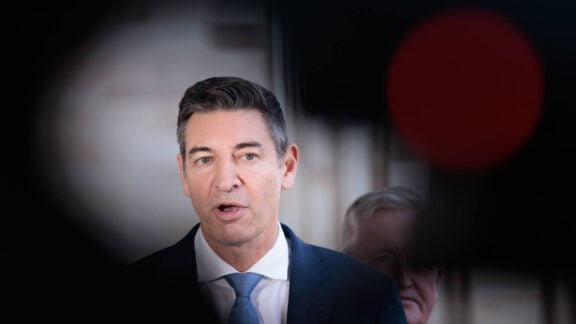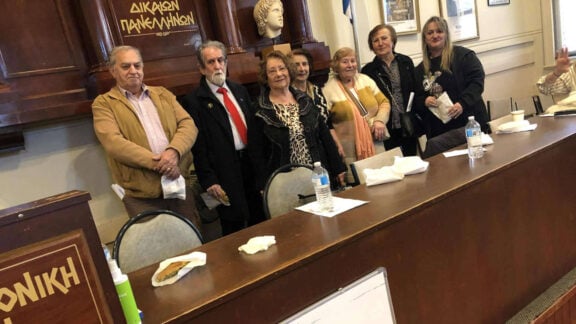With full support from the Ministry of Foreign Affairs of Greece and the Holy Archdiocese of Australia, a branch of the National Foundation for Research and Studies ‘Eleftherios K. Venizelos’ was launched in Melbourne last Thursday at the Lyceum Hall, Alphington Grammar School.
The foundation headquarters are in Chania and it has been the desire and goal of the National Foundation and its General Director, historian, author, and lawyer Nikolaos Papadakis-Papadis, to operate a branch in Australia, specifically in the Oceania region, with Melbourne as its base. The aim is to preserve and promote the historical memory and contribution of the national leader Eleftherios Venizelos.
The establishment of the branch is has the support of local organisations – the Cretan Federation of Australia and New Zealand, Greek Community of Melbourne and Victoria, Greek Community of Western Australia, Australian Institute of Macedonian Studies, Australian Institute of Greek Studies, Greek-Australian Chamber of Commerce and Industry, Cretan Fraternity of Melbourne, Australian Federation of Pontian Associations, Cretan Fraternity of New South Wales, and Pancretan Association of Melbourne.
Over a hundred Greek leaders, representatives of organisations, historians and writers gathered at the Lyceum hall. Visual and audio messages from Greece were delivered by the Secretary-General of the Hellenic Diaspora, Professor Ioannis Chrysoulakis, on behalf of the Greek Government and the Ministry of Foreign Affairs, as well as the General Director of the National Foundation for Research, Mr Papadakis.

The event was attended by the Archbishop of Australia Makarios, who sent his greetings through Bishop of Kerasountos, Evmenios, and the Consul General of Greece in Northern Territory, Ioannis Aniktomatis, AO. The Consul of Greece in New Zealand, George Neonakis, also participated, including the President of the Cretan Brotherhood of New South Wales, Emmanouil Vitenzakis, representing Sydney.
It is worth noting that the expenses for the reception of the evening were undertaken by Christina Kotsifaki-Sarri and her husband, who also hosted a dinner afterwards for the guests from other States. The technical responsibility and organisation were handled by Georgios Lioukas and Nikolaos Papakonstantinou, close collaborators of the Australian Institute of Macedonian Studies. The event was videographed by Platon Denezakis.
The founding assembly, was opened by educator, Natasa Spanou and the Director of Alphington Grammar Vivian Nikou, was invited to welcome the founding members of the branch, she acknowledged the First Peoples and then pioneering Greek immigrants. Dr Nikou said that Alphington Grammar stands in solidarity with all the struggles of the diaspora to preserve the ethno-linguistic identity of Hellenism and welcomed the new nationwide cultural entity.
Mrs Spanou then invited Bishop Evmenios, the Most Reverend Bishop of Kerasountos, to speak who emphasised the significance of this new cultural project as a spiritual bridge between Hellenism in mainland Greece and the Greek diaspora. He highlighted the importance of the branch in promoting historical memory and Greek language proficiency, stating that “without learning and using the Greek language, Orthodoxy cannot be preserved.” The Bishop called on the Greek community to be “vigilant and engage in continuous efforts to preserve our linguistic and religious identity.” He expressed gratitude to all those involved in transplanting the activities of the National Research Foundation from Chania to Melbourne. It is worth noting that Bishop Evmenios was the first to sign the Founding Assembly as a member of the Oceania Annex.

Ioannis Aniktomatis, the Consul General of Greece in Northern Australia and former Governor of the region took to the stage next.
He thanked the organisers for the honour of including him among the founding members of the Annex and highlighted the Annex’s role in promoting Greece and Hellenism in Oceania and Australia.
He called on the Greek community to support this cultural initiative, stating, “I enlist to ally with this effort and offer myself without limitations, both ideological and personal, wherever and however I can.”
Next, a video message from Mr Chrysoulakis was projected on the screen. He greeted the attendees and stressed the significance of establishing the chapter. He acknowledged the research and academic work undertaken by those who were called to serve on its Administrative Council.
“It would particularly focus on research and study of topics related to Venizelos and his era, as presented in Australian literature, archives of Australia and Britain, and Greek-language newspapers of the time circulated in Sydney, Brisbane, and Melbourne. It would place special emphasis on issues that promote broader and deeper awareness and sensitize second and third-generation Greek Australians, history students, Greek language educators, students, and anyone interested in learning about the history of modern Greece. The branch would serve as a center for documentation and data search, as well as a reference point for matters concerning Venizelos and his era. It would organise conferences, invite international personalities, conduct student competitions, publish works, cultivate Greek-language literature, and encourage research and studies,” Mr Chrysoulakis said.
The message of Mr Papadakis-Papadi, the Director-General of the National Foundation for Research and Studies ‘Eleftherios K. Venizelos’ from Chania followed.
The distinguished author and historian appeared on the screen, greeting the members before he provided a historical background on the establishment of the National Foundation in 2000 to preserve historical memory and educate about the work and contribution of the “Ethnarch Venizelos”.
In addition, Tony Tsourdalakis, President of the Cretan Federation of Australia and New Zealand presented the story behind the founding of the Chania organisation on March 26, 2000, and highlighted that “The Oceania Branch, the first branch of this level to be established on the third continent, which will closely collaborate with the National Foundation ‘Eleftherios Venizelos’ in Greece, will focus on research and studies on topics related to the great national leader Venizelos and his era, as they are presented in Australian literature, archives of Australia and Britain, Greek-language newspapers circulating in Sydney, Brisbane, and Melbourne at that time. It will emphasize issues of broader and deeper awareness and raise awareness among second and third-generation Greek Australians, history students, Greek language educators, students, and all those who wish to learn about the history of modern Greece.”
“Through the Branch of the Foundation, the national vision of the most visionary and communicative Greek politician and patriot of the 20th century will be promoted at a Pan-Australian level, and the relations between Greece and Australia will be strengthened, so that it becomes a shield of modern Greece in contemporary challenges. Additionally, the Foundation is intended to support the academic and educational sector. It will be able to convene conferences, invite international personalities, organize student competitions, publish works, cultivate Greek-language literature, and encourage research and studies,” added Mr Tsourdalakis.

The signed declaration. Photo: Supplied

The signed declaration. Photo: Supplied

The signed declaration. Photo: Supplied
The last speaker was the President of the Australian Institute of Macedonian Studies, Professor Anastasios M. Tamis, who praised the contribution of Eleftherios Venizelos during the most turbulent period of Hellenism, from the establishment of the modern Greek state. He referred to the “narcissism and recklessness of the Greeks”, as well as their “self-destructive passion”, and called on the attendees to evaluate the difficult phases of Greek history, particularly the paradox of the civil rupture with tolerance and magnanimity.
“We are unique worldwide in terms of the number of civil wars we have fought as fratricidal conflicts from the 11th century BC until 1949 AD, but we are also unique in having a history of survival in the Diaspora from the 8th century BC to the present day.”
He referred the Polish academic George Smolitz, who addressed Mr Tamis at an international conference and asked, “If you Greeks, with 3,000 years of survival in foreign lands and in the Diaspora, don’t teach us how to withstand ethno-linguistic and cultural challenges, what hope do the rest of us have?”
“Eleftherios Venizelos was an ideology and a movement, an example of an enlightened Greek patriot, a leader of Greece in its liberation struggles, a model of political science, and an example to be emulated. History, which calmly evaluates and ranks, has placed him in the position of Ethnarch, a historical figure who stands above political ideologies, party factions, and partisan events. Venizelos belongs to all Greeks, all factions and eras, all ideologies, like Aristotle, like Kolokotronis, like Constantine Karamanlis,” Mr Tamis said in his unifying speech.







